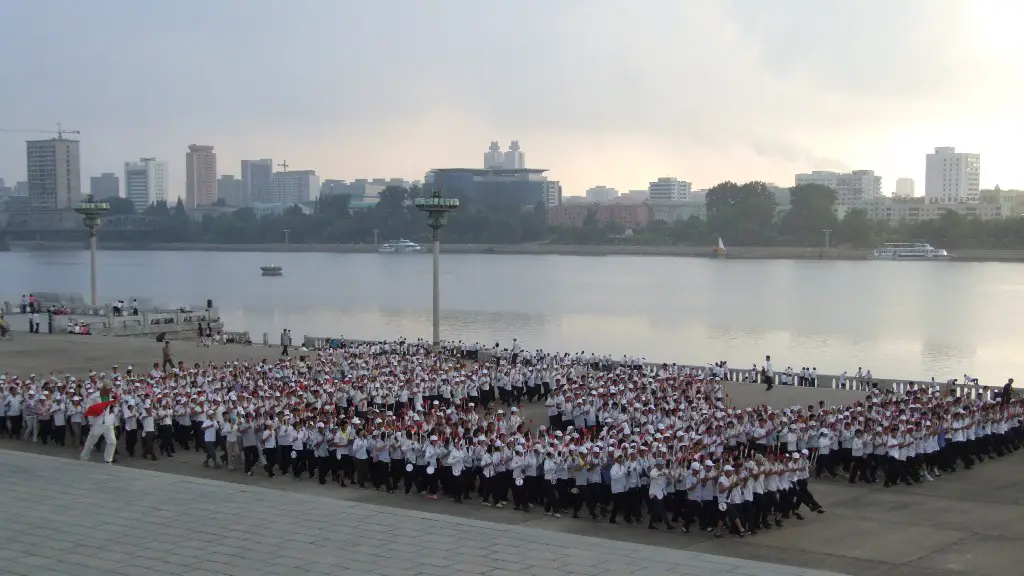Background information
The North Korean crisis is a serious concern for the international community given the deepening political and military tensions between North Korea and its neighbours and the United States. North Korea is a reclusive state that has been accused of developing nuclear weapons, as well as numerous human rights violations. Despite decades of economic sanctions, North Korea has been able to sustain its nuclear weapons programme, leading to increasing international concern. The crisis has become increasingly complex due to North Korea’s isolation from the international community and its refusal to take part in diplomatic talks. The situation has prompted the United Nations, the United States and other nations to call for the elimination of North Korea’s nuclear weapons program, which North Korea has refused to do.
International Perspective
The international community has taken numerous efforts to reduce, or even eliminate, the North Korean nuclear program. The United Nations Security Council has imposed several economic sanctions on North Korea in response to its nuclear development. Additionally, the United States has engaged in diplomatic efforts to persuade North Korea to halt its nuclear program. The United States has also taken steps to strengthen regional powers, such as Japan and South Korea, that are located near North Korea and thus have the most at stake in the situation.
The European Union has also urged North Korea to end its nuclear program and move towards peace and stability in the region. The EU has called for the establishment of a peaceful dialogue between North Korea and its neighbours, and has sent its foreign policy chief to the region to attempt to bring about a diplomatic solution.
China’s Involvement
China, as a close ally of North Korea and its main economic partner, has also taken part in diplomatic efforts to reduce tensions in the Korean peninsula. China has long argued for a peaceful resolution to the crisis, and has called for the North to give up its nuclear weapons while also obeying international sanctions. China has also urged North Korea to return to the stalled Six-Party Talks, which were designed to find a comprehensive solution to the crisis involving China, Japan, Russia, South Korea, the United States and North Korea.
North Korea’s Perspective
North Korea has largely refused to negotiate with the international community and has repeatedly defied UN Security council resolutions. The North has refused to abandon its nuclear program and has stated that it will not do so unless the United States and South Korea agree to sign a peace treaty, guarantee North Korea’s security, and lift all economic sanctions.
North Korea has viewed the ongoing crisis as the result of the United States’ hostile policy, and has accused it of aggression, citing the U.S.’ plans for military drills with South Korea and deployment of additional troops in the region. North Korea has thus sought to create a balance of power in the region through its nuclear ambitions and strengthen its own security by deterring any possible attack from the United States and its allies.
Analyzing the Options
Given the complexity of the situation, there are several possible solutions that the international community can explore in order to resolve the North Korean crisis. The most viable option appears to be a diplomatic solution, which would involve the United States and South Korea engaging in negotiations with North Korea. Given North Korea’s demand for security guarantees and removal of sanctions, these negotiations could focus on addressing North Korea’s concerns and providing incentives for the regime to abandon its nuclear weapons program.
In addition to diplomatic efforts, other possible solutions may include the use of economic sanctions and stricter enforcement of UN Security Council resolutions. Sanctions have been used several times in the past but have been largely unsuccessful in curtailing North Korea’s nuclear ambitions. Thus, further efforts may be needed to make sanctions more effective. Additionally, steps should also be taken to improve the implementation of existing UN Security Council resolutions. Finally, regional powers such as China may have to take greater steps to ensure that North Korea meets its international obligations.
Alternate Approaches
The international community also needs to consider alternative approaches to solving the crisis, such as economic development and regional cooperation. Providing economic aid and assistance to North Korea may be one way to encourage the regime to give up its nuclear weapons program. This could also be complemented by regional cooperation involving North and South Korea, China, the United States and other countries in the region. This could lead to the establishment of trust between North and South Korea and could help reduce tensions in the region.
Finally, there is also the potential to engage North Korea in greater dialogue. North Korea has refused to take part in diplomatic talks, yet it continues to express its grievances through occasional statements and hostile rhetoric. By engaging North Korea in conversations, the international community may be able to better understand the regime’s motives and create an environment that could lead to more constructive dialogue and eventually, a peaceful resolution to the crisis.
International Consequences
The international community must realize that any failed attempts to resolve the North Korean crisis would have serious consequences for the region. North Korea is a nuclear-armed state and any military confrontation could easily lead to a large-scale conflict. In addition, the nuclear threat posed by North Korea is deeply concerning not just to its neighbours but also to the world. If the North Korean crisis remains unresolved, the risk of a nuclear accident or miscalculation will only increase, leading to serious consequences for the region.
United States’ Role
The United States has a vital role to play in solving the North Korean crisis. As the primary actor in the crisis, the United States has significant leverage over North Korea and should take the lead in negotiations and apply pressure on the regime to end its nuclear program. While the U.S. should be willing to provide security guarantees and incentives for North Korea to denuclearize, it should also be prepared to use military force if necessary. This would demonstrate to North Korea the resolve of the United States and its allies and could be an effective deterrent if the North does not comply with international obligations.
Conclusion of Strategies
The solution to the North Korean crisis requires a multi-faceted approach that involves diplomatic efforts, economic sanctions, regional cooperation and international pressure. The international community must be unified in its efforts, as any failure to resolve the crisis could have devastating consequences. The United States must also take a leading role in the effort, as its actions will have a drastic impact on how the situation ultimately resolves. With all of the potential risks and challenges involved, the resolution of the crisis will require tremendous effort, but it is essential that the international community remain committed to finding a peaceful and lasting solution.


